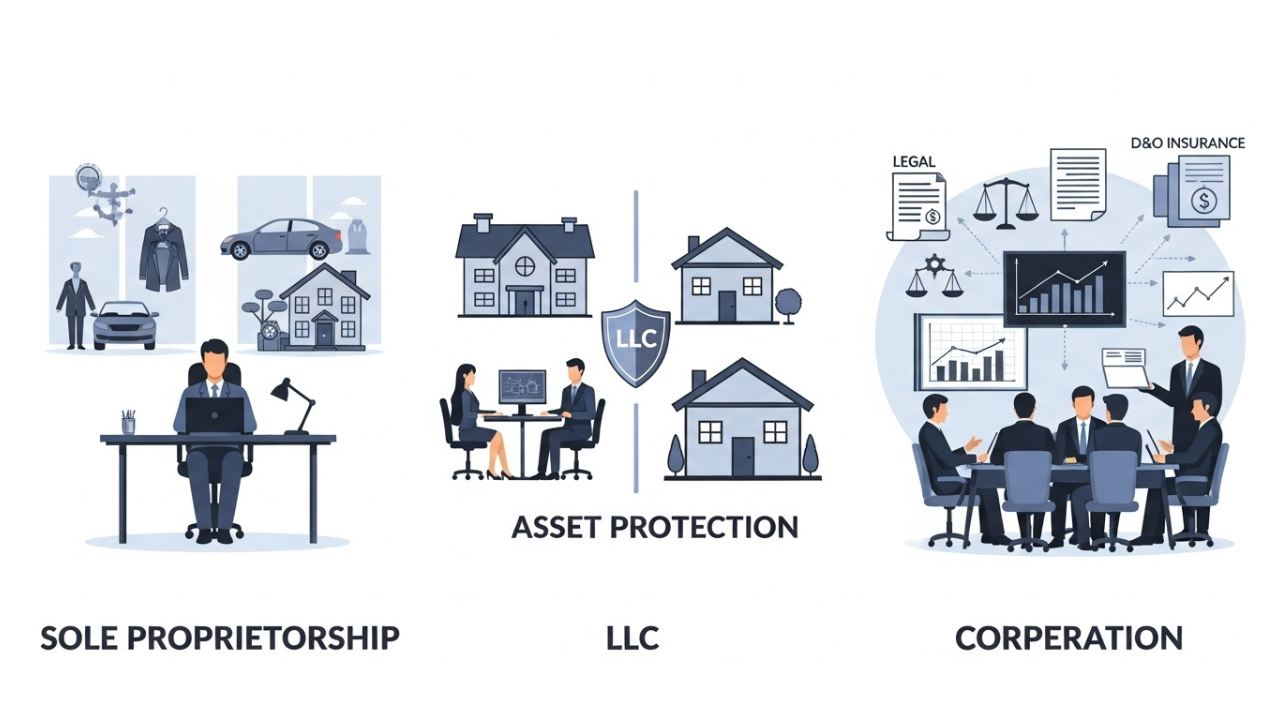Launching a new business is an electrifying yet often daunting venture. You have a grand vision, deep insights and game changing concepts, ambitious plans and forecasts, and a razor sharp clarity that is hard to find. However, one crucial aspect that may not be on your checklist is: insurance.
Overlooking insurance requirements and day to day operations is perfectly normal, especially from an operational overseeing standpoint. Assessing your insurance policies early on will save you hustle, expense, and headache way down the road; trust me. The absence of appropriate coverage can expose your business to enormous risks—from crippling financial consequences to cumbersome legal challenges—that could easily cripple your startup.
I will help you step by step assess insurances requirements your startup needs. In this guide, you will gather information regarding the applicable insurance coverages, the dynamic factors to be assessed concerning your business, and how to ensure that your business whilst affording it an optimum level of protection. With the guide, I also included self-evident examples as well as insider tips that will arm every informed decision you make for your startup.
Key Takeaways
- Identifying Insurance Needs: Begin by defining the potential risks that could threaten your business. That will help you make informed decisions regarding the insurance policy your company needs.
- Types of Insurance: The most prominent insurances for new businesses are general liability insurance, property insurance as well as worker injuries insurance.
- Business Structure Matters: The legal form of your business, either LLC or sole proprietor, will also dictate the type of insurance you will need.
- Understanding Risks: Understanding from the outset what risks your business may be exposed to such as product liability or data breaches will immensely help your insurance decisions.
- Cost Considerations: Although it is an expense for the business, insurance serves as an investment, especially when it mitigates the risk of incurring losses.
How to Assess Insurance Needs for Startups?
When evaluating the insurance requirements of a startup, the approach taken is critical to the success of the business as a whole because there is no standard way of doing it. Every business is unique. Specifically, the risks that your business faces will vary depending on the industry, size, and location of the startup. Nevertheless, there are fundamental actions you can undertake to ensure the types of insurance coverage necessary are adequately catered for.
Identify the Risks Associated with Your Startup
The very first process in assessing the insurance requirements of the business is to define what the risks factors are. The first thing to be aware of is that in one way or another there is going to be some risks involved. Take for instance any new business, be it physical, online, or service based, they all face challenges.
To kick things off, ask yourself the following questions:
- Do you have resourced workforce? If the answer yes, then you probably require to have workers-compensation insurance.
- Do you provide services and products? Then you may require to have a product liability insurance for your product in case it is harmful to the users.
- Are you managing sensitive information or data? If yes, then you require a cyber insurance to protect you from breaches towards your sensitive information or data.
By evaluating these risks, you are able to identify what type of insurance policies your startup needs. Let’s go through some of the more common risks:
Legal Liability
Every business faces some degree of potential lawsuits from customers, clients, or even within their employees. Business claims are popular even in new growing companies for example a customer may file a claim even after getting due notice. Business liability insurance can take care of company paid legal costs, and also settles and pays judgment wins, and provides cover for claims on bodily injury, property damage advertising errors.
Property Damage
If your company holds physical assets like property, equipment and stocks, you must hold property insurance. This will cover the damage and the repair or replacement of your assets with respect to fire, theft, flood, and or any natural disasters. Without property insurance, a company can suddenly come up against unexpected fires leading to assets wiping amounts without adequate cover in place.
Employee Risks
Your team expands so employee related risks become prominent. These include paying for Employment insurance for employees and also for employment related injuries. As an illustration employee health insurance is a necessity in nearly every state. When an employee is paid these benefits, employer funded medical costs and lost earnings are forgiven. For EPLI covering employer related roles claim like harassment for wrongful dismal based on discrimination becomes necessary.
Understand Your Business Structure
The structure of your business significantly impacts the nature of insurance you will require. If you have a sole proprietorship, LLC, or a corporation, all of them have varying risks and legal responsibilities to consider. As a list of these considerations, here’s a summary of how each impacts your insurance requirements.
Sole Proprietorship
Being a sole proprietor means you are the head of your business and thus, fully liable for the debts and other obligations attached to the business. In such a case, if someone files a lawsuit against the business, you could lose personal property like your house or car. It would also be advisable to implement general liability insurance alongside umbrella insurance for added personal asset coverage..
Limited Liability Company (LLC)
For a startup structured as an LLC, your personal assets are at least more protected than in a sole proprietorship since they’re usually shielded from the liabilities of the business. You do, however, need to purchase business insurance to defend the company’s assets. If you provide consulting or other professional services, you may require professional liability insurance.
Corporation
With larger startups or corporations, they would require D&O (Directors and Officers) insurance, which covers the assets of persons serving on the board or as an officer from personal liability concerning their roles on the board of directors. Your corporation will also need the standard coverages such as general liability and property insurance.
Determine the Size and Scope of Your Startup
Your scope delaing with insurance needs for your startup will be vital in evaluating its size and scope. A budding small business with a limited number of employees may only require basic insurance coverage. Comparatively, a more grown startup having multiple employees, a physical location, and international customers will have more complex insurance requirements.
What Does Your Business Do?
This scope of the business you operate will determine your insurance requirements, for instance:
- Tech startups might hedge against data breaches and hacks with cybersecurity insurance.
- Construction businesses might need builder’s risk insurance to protect against the hazards of construction projects.
- Food businesses, having the risk of foodborne illnesses, would require product liability insurance.
Employee Count
If you have employees, you will require purchasing workers compensation insurance. The amount of employees a firm has and the premium rate are generally linked to one another, considering that larger firms tend to have higher premium RATEs. Furthermore, some states mandate coverages such as unemployment insurance or disability insurance, making them mandatory.
Consider Specialized Insurance for Unique Risks
Businesses, including certain industries and startups, may require unique insurance coverage tailored for them. This consists of:
- Product Liability Insurance: This coverage is necessary if you manufacture or deal in products as it covers claims made as a result of defects arising from your products or from your products causing harm.
- Professional Liability Insurance: Also referred to as Errors and Omissions Insurance, this is vital for businesses that provide services by offering advice or performing specific tasks on their clients’ behalves. It defends claims made against the business considering negligence in the provision of services or breach of contractual obligations.
- Cybersecurity Insurance: Cybersecurity Insurance is very important for tech startups or businesses that store sensitive data. This insurance helps to suit costs incurred sough to recover from cyberattacks, data breach, and loss of customer data.
Assess the Costs and Budget
I understand, from experience, running a startup means every dollar counts and the insurance cost can appear daunting. However, think of insurance as securing the future of your business. The right cover helps manage risk and avoids financial ruin due to unforeseen events so the startup can survive through difficult periods.
Shop Around for Quotes
The first insurance company you encounter might not always be the best. It’s smart to look for other quotes and find a better deal that meets your expectations. To make your job easier, consider hiring an insurance broker who will help you navigate through the options and select policies that fit your budget.
Prioritize Essential Coverage
Every startup knows the importance of insurance, but at the same time, they understand the limitations of cash flow in the beginning stages of a business. Prioritize the insurance coverage that is a must-have, for example, general liability and workers’ compensation. Consider getting more niche coverage once your business increases in size and your budget allows.
My Opinion
Analyzing the insurances for your startup is not a one-off project, it is a continuous workflow. With your business expansion, the risks will evolve, and likewise, the insurance coverage will need to change. The more time you spend understanding your risks, business structure, industry-specific needs, the more likely you are to ensure that your startup is protected.
Keep in mind that no one is capable of predicting the future; however, with the right insurance policy, you can be prepared for any surprises that may occur. Be it a potential lawsuit, cyberattack, or injury sustained by an employee — rest assured knowing your business will be protected.





























Leave a Reply